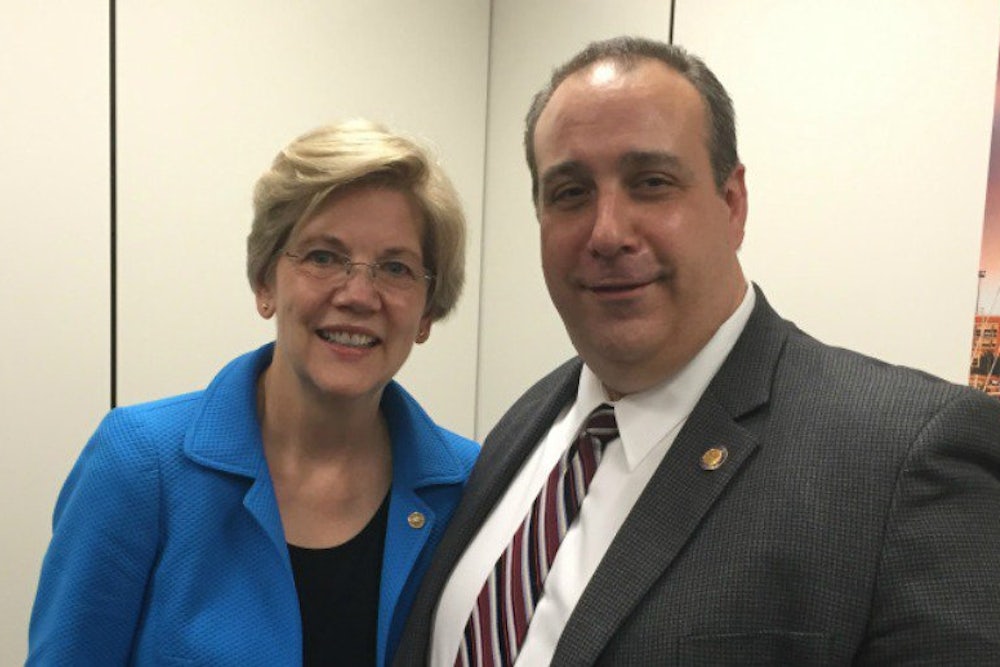Police chief Lenny Campanello stood in his office in Gloucester on a Monday morning, wearing a striped button-down shirt and stubble on his face. He looked more like a school principal at the end of a long day than a cop preparing to go to Washington and speak with politicians about the heroin crisis in his coastal Massachusetts town.
“I’m going to shave for tomorrow,” he said in his thick Massachusetts accent, giving a small smile before going back to stapling photocopied handouts.
This all happened because Campanello—fed up with the opiate epidemic spreading through Gloucester, having faced four overdose deaths in the first three months of 2015 in a town of 30,000—posted a message on May 4 on the department’s Facebook page that read, in part:
We are poised to make revolutionary changes in the way we treat this DISEASE. Your Police Department vowed to take the following measures to assist, beginning June 1, 2015:
- Any addict who walks into the police station with the remainder of their drug equipment (needles, etc) or drugs and asks for help will NOT be charged. Instead we will walk them through the system toward detox and recovery. We will assign them an "angel" who will be their guide through the process. Not in hours or days, but on the spot. Addison Gilbert and Lahey Clinic have committed to helping fast track people that walk into the police department so that they can be assessed quickly and the proper care can be administered quickly.
The post from the police chief who refused to charge drug users with a crime went viral, with more than two million views. Campanello’s message resonated (you can see in the comments in that post alone), in part, because of how rare its messenger was: Cops usually don’t use words like “disease” when it comes to addicts or preach rehabilitation over incarceration as a path to fixing a problem. And while his plan is still being shaped, its main mission is to send addicts straight to rehab, including a set of volunteers who will help them through the process.
The commenters’ gratitude for the chief’s unique approach did not go unnoticed by politicians. The next day during that D.C. trip, Campanello would meet with both U.S. senators from Massachusetts, Elizabeth Warren and Ed Markey, as well as one of its congressmen, Seth Moulton. He also spoke with members of the White House Office of National Drug Control Policy.
Campanello went there urging them to pass drug reform legislation that would include earmarking portions of federal criminal seizure money for addiction recovery, while also challenging the prescription pill crisis and Big Pharma, which he says doesn’t intimidate him. I asked him if he’s really going to go up against them.
“I don’t give a shit; I’m an appointed official,” he said. “You can quote me on that. I work for the city of Gloucester, I don’t work for a pharmaceutical company.”
I grew up in Ipswich, Massachusetts. Gloucester was always our slightly bigger, much seedier neighbor 15 minutes to the south. But the opiate crisis has hit my hometown, too. It’s all over New England; Massachusetts alone recorded 185 suspected overdose deaths between November 2014 and February this year—and that’s minus the state’s three biggest cities. People in this region are more exhausted than anything.
Campanello, who’s been in Gloucester since 2012 after years with the Saugus Police Department—where he helped build its drug unit—knew his town wasn’t alone. He also knew he had to do something.
“The thing that happens in Gloucester is that we talk about it; we’re close-knit, everybody knows everybody else’s business,” he said. “We don’t believe hiding things in the shadows. In this particular instance, the police decided to become one of the portals to care for these individuals.”
Campanello is trying something different, maybe even revolutionary. But is this even possible? Are drug addicts really going to have an epiphany and turn in their drugs—and surrender to cops? In what world would that be realistic? Will the money be there to open more beds at the hospital and offer a true post-rehab or post-jail landing spot once addicts are flushed back out on their own? And what about the ones who come from more wealth and quietly live in the shadows with the stigma and shame of it?
“My initial hesitation was why would addicts need to bring in their drugs and paraphernalia,” one local who works on the frontlines told me. “Most addicts I know wouldn’t have any drugs left. Hopefully, there’s really good intentions [by police].”
Campanello admits the turn-in system that will begin on June 1 is not a “get-out-of-jail-free card.” If an addict is caught with drugs on the street or elsewhere and says she or he was on his way to turn them in, he’ll likely still be arrested. He also brings up the “Broken Windows” theory of policing, which makes me pause about whether he really wants to urge rehabilitation over law enforcement; his point is that the original intention of “Broken Windows” was to make community and society stronger. And Campanello still doesn’t have many of the details ironed out—including the precise economics of it, especially free beds at the local hospital, which I’m told is a major issue. In fairness, there are many moving parts, still. He has until the end of the month.
“I would be happy if a thousand people came in, or nobody came in, because what we’ve already done is we’ve accomplished the biggest goal of all: to bring this issue into the light,” Campanello said.
With many questions unanswered, I sought out Gloucester residents to get a better gauge of how this is playing out and whether they think this has even a remote chance of working. Until a few weeks ago, Gloucester was most famous for fishing—and as the departure point for the ill-fated Andrea Gail, the ship and crew that were immortalized in The Perfect Storm, both book and movie. It's also known for 2008's so-called “Pregnancy Pact.” But could Gloucester instead one day be thought of as the place that revolutionized how we police and treat drug addicts?
Sander Schulz is originally from Colorado but came here during his time in the Navy. He's been running emergency services for the Gloucester Fire Department for ten years. Gloucester was, after all, the first city in the country where both fire and police departments carried nasal Narcan—an opiate antidote which can revive people from overdoses—and Schulz has overseen every part of that plan, since his team usually is the first on the scene to administer the drug to overdosing patients.
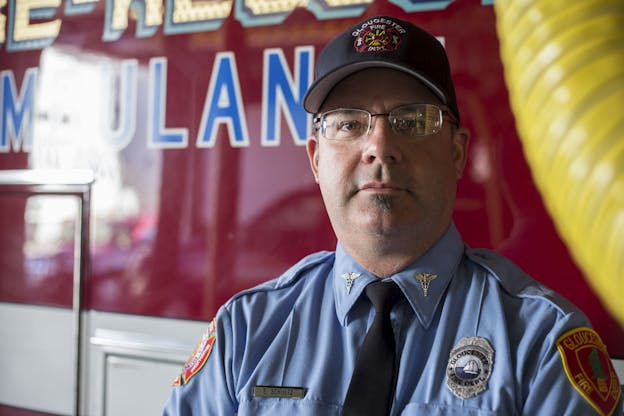
“It’s great; you walk in, somebody’s overdosed, they’re not breathing, they’re blue—and you give them Narcan, and they wake up,” Schultz told me. “We were using Narcan for a long time. The joke for years has been, ‘Oh, jeez, why don’t you just put it in the water?’ And you know, there’s some truth to that.”
Schulz is also part of a high-risk task force here, a non-profit collaborative that meets once a month to try and tackle the enormous drug problem that envelops the city. (Campanello is also on that task force, as is Joan Whitney, director of substance abuse prevention with the city’s Department of Health.) Schulz said he knows there are some people in town who push back on the idea, believing that it’s giving the addicts “a free ride.”
“If one mother saves her kid from dying and that kid can turn around and get into recovery? Just a single life?” Schulz asked. “If it’s just one and all I have to is say ‘yes’ go ahead and do it? Hell, yes.”
He is hopeful. But is it realistic, this turn-in system with the readily available Narcan doses?
“My optimism stems from [this]: At least there’s an interest in looking at this as an issue,” he said. “It’s going to take some time, but a year from now maybe somebody somewhere will come up with something bigger.”
Another member of that task force is local pharmacist Alex Doyle, who took an hour out of his day last week to show me Narcan and explain its use. His parents own Conley’s pharmacy, established in 1880 in Ipswich. It is the pharmacy I grew up with and the one my family still frequents. There is an outpost now in Gloucester, too, but Doyle is from Ipswich, too, and has witnessed just how awful the explosion of opiate use has been in the area. He told me his pharmacy in Gloucester has issued 80 doses of Narcan since last year. Normally it takes two doses to be effective, and he’s unclear, obviously, how many have been deployed.
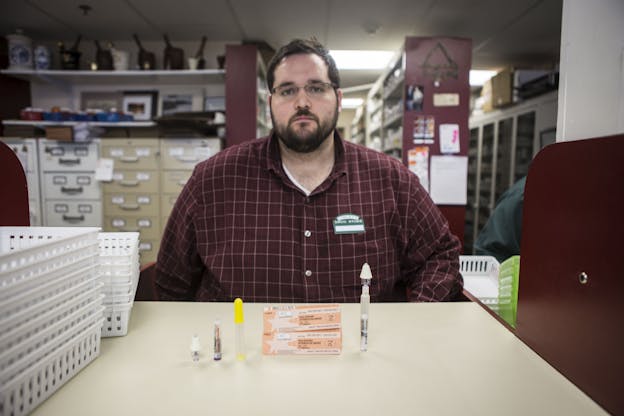
“It’s a great community here and I think it’s because it’s, in essence, an island,” said Doyle, 32. “I’m proud to be part of the task force and that Campanello is thinking of innovative approaches.”
He isn’t sure yet about how much Conley’s will be able to offer the Narcan for and is still awaiting more details. “It’s happening too much so I really hope what they’re doing in Gloucester will start to make a change,” he says. “One death is too many.”
When I spoke with Kathy Day, she was soft-spoken and calm, two important qualities when working with families of addicts. Day helps run a program out of Gloucester called Learn To Cope, and she not only counsels families who have had loved ones die of overdoses or who are current addicts, but she also helps administer nasal Narcan to locals as part of a pilot program now-former Massachusetts Governor Deval Patrick made as part of an emergency plan last year to tackle the state’s opiate crisis.
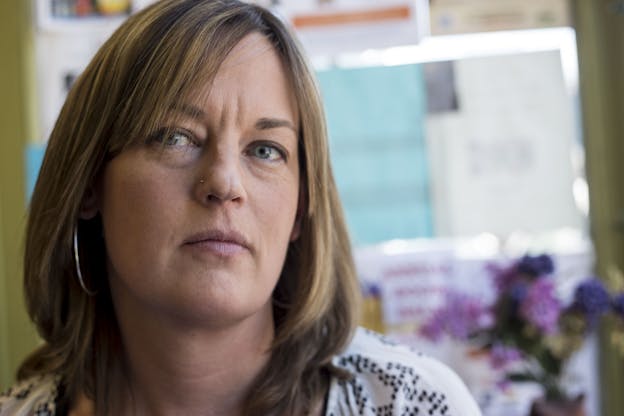
Part of Campanello’s viral Facebook decree was a plan to work with local pharmacies to set a lower price of Narcan for those who want it and don’t have insurance (CVS has committed to offering it for $20). Day has already been doing that in the community—for free—through the Patrick pilot program. She also trains addicts as well as friends and family members, usually in her home, on how to use it and administer it. Though she advertises about it locally, people find out largely through word-of-mouth.
“The thing I like most about it is his use of language and him talking about addiction and disease,” she told me about Campanello. “That’s a huge shift from what we’ve been seeing.
“I know language is one thing, but using that language and mindset is always a good thing. The family members suffer from so much stigma associated with it, and if it helps take away some of that stigma that’s a good thing. I’m cautiously optimistic.”
Like Doyle and Day, Susan Coviello has a cautious glass half-full outlook on the chief’s decree. The North Shore Health Project, where she works as the executive director, provides free counseling and guidance to people living with HIV/AIDS and Hepatitis C. Most of Coviello's clients have been infected through past drug use.
“I applaud him, we applaud him,” she said about Campanello. “I think it’s amazing. What really surprised me was how it wasn’t like this was the three-hundredth chief in the United States that’s decided to do this. It was like: This is the first time anybody’s ever talked about addiction, and police, and trying to help. When I realized just how unique a situation it is, I was very, very impressed.”
That said, Coviello, who is also part of the task force, believes more is needed in Gloucester, including a needle exchange, which she says they are in the processing of procuring. She has walked to work and seen needles strewn in the streets, stood in line for bathrooms at local restaurants where she thinks people are using drugs in them, and knows clients who have died, presumably from overdoses.
If any addict is going to turn their drugs into the police station, Coviello told me, she thinks it would be a scenario where a family member encourages them to take that step and accompanies them there.
“I think it’s great in theory,” she said. “In reality, there has to be compassionate response training for all of the officers so there isn’t any reaction to somebody. There isn’t an eye roll or a face made… I think that’s going to take some training, I’m not sure who’s going to do that training for them. But to react compassionately rather than the instinct you have when you’re a police officer and you confront somebody who’s carrying drugs.”
One of those somebodies is “Smitty,” a homeless drug addict in his mid-forties who I met in Gloucester. He’s lived here since he was a teenager, the son of a heroin user. He himself has used heroin on and off for the past 20 years and has spent most of his life addicted to various drugs. He hasn’t shot heroin or cocaine in a few years; his current drug of choice is smoking K2, a marijuana synthetic that is often sold in head shops.
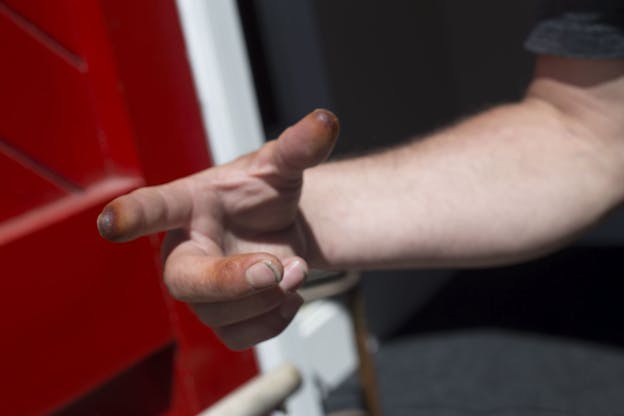
He is a regular at the Grace Center, a group that meets three days a week at rotating churches where the homeless (and often drug-addicted) go to seek help, food, and even a place to nod off. “Smitty” wanted to use his real name and have his face photographed for this report, but he worried his probation officer may see it and tack on more time in jail, where he estimated he’s spent roughly ten years of his life, on and off.
He’s afraid he’s going to die but still has so much hope he can somehow get clean and end the cycle. When he read about Campanello’s plan in the local paper, “Smitty” had his doubts. “[I] laughed my ass off. I can never see somebody, anybody doing that,” he said, referring to fellow addicts. “I wondered whether they were just trying to make a name for themselves—or, if deep down inside, they want to do it for the right reasons?”
Janelle, 50, has lived in Gloucester her entire life. Her older brother was a heroin addict for more than 20 years; often during her childhood, the entire focus of her family was on her brother’s addiction. He has been on methadone for a while now, but Janelle, like most people from Gloucester, has seen many friends die and myriad others overdose. She bartends at The Crow’s Nest, only a few doors down from the only shelter in town, which is “wet”—not from rain or water leaks, but from alcohol and drugs. The first night I was in The Crow’s Nest, a man who clearly was cranked up on some kind of drug was buying a beer with loose change and moving throughout the bar at such a fast-twitched pace, it was impossible to ignore him.
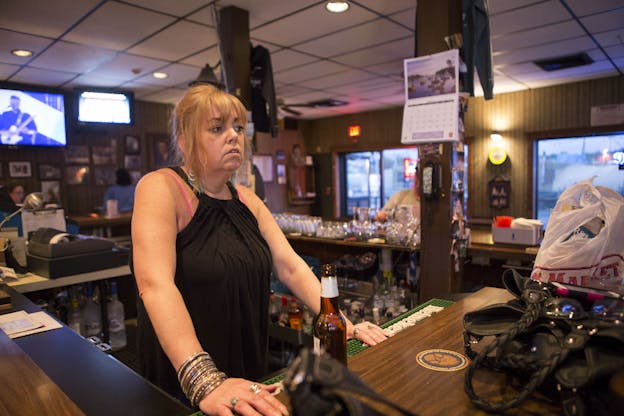
The locals in there were unenthused.
“It’s an epidemic,” Janelle said. “Literally you could stop anyone in the street and they have a family member it’s affected. It’s very scary.”
She told me she thinks what Campanello is doing can’t hurt, and says she’s keeping an open mind. She said she was “thinking about it today and how many people have died and about a good friend who killed himself because he couldn’t get methadone anymore,” and that “possibly it will help some.”
Susie, 57 and also a bartender here, didn’t agree. She called Campanello’s approach “a fucking joke. A slap on the wrist; as a mother, it’s a joke. I get so sick of seeing it, I just have no empathy anymore.” Susie has tired of all the drugs, the addicts, the excuses. She scrolls through her phone and plays Sade’s “By Your Side” on the electronic jukebox.
“It’s a beautiful place as far as the scenic goes,” Susie said, pushing her falling black-rimmed glasses back up to square with my eyes, “but if you dig beneath the surface, people die every day here.”
